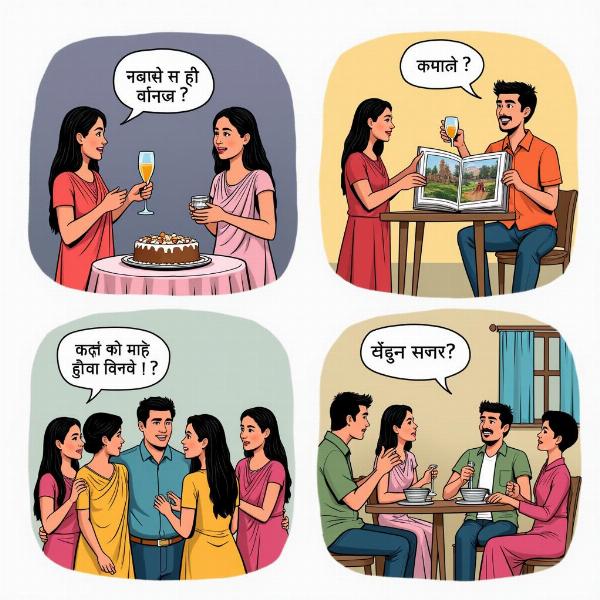Understanding the Hindi equivalent of “who are they” can be tricky, as it depends heavily on context and the level of formality you wish to convey. This seemingly simple phrase can translate into various forms in Hindi, each carrying a slightly different nuance. Knowing which one to use is key to clear communication and demonstrating respect for cultural subtleties.
Decoding “Who Are They” in Hindi
Several Hindi phrases can convey the meaning of “who are they?” Let’s explore some of the most common options and the situations in which they are most appropriate.
-
ये कौन हैं? (Ye kaun hain?): This is perhaps the most common and versatile translation. It’s respectful and suitable for most situations. “Ye” means “these” or “this” (plural) and “kaun” means “who.” “Hain” is the present tense form of the verb “to be.”
-
वो कौन हैं? (Vo kaun hain?): This translates to “who are those?” Use this when referring to people further away or not immediately present. “Vo” means “those” or “that” (plural).
-
ये लोग कौन हैं? (Ye log kaun hain?): This phrase is more emphatic, emphasizing the plurality of the group. “Log” means “people.” Use this when referring to a clearly defined group of individuals.
-
वे कौन हैं? (Ve kaun hain?): This is a more formal and respectful version, often used in written Hindi or when addressing elders or superiors. “Ve” is a respectful pronoun for “they.”
Choosing the Right Phrase
The specific context of your conversation dictates which phrase is most suitable. Consider the following examples:
-
Informal setting: When asking a friend about a group of people across the street, “Ye kaun hain?” or “Vo kaun hain?” would be appropriate.
-
Formal setting: When inquiring about the identity of guests at a formal event, “Ye log kaun hain?” or the more respectful “Ve kaun hain?” would be better choices.
Beyond the Basics: Gender and Number
Hindi grammar incorporates gender and number into its pronouns. While the examples above use the plural form “hain,” which works for both masculine and feminine subjects, a deeper understanding of these nuances can enhance your communication. For instance, when referring to a mixed group or when the gender is unknown, “hain” is always correct. However, if referring to a group of solely women, “hain” remains appropriate but using the specifically feminine “हैं” (pronounced the same, ‘hain’) reflects greater grammatical accuracy.
Asking “Who Are They?” in Different Situations
- At a party: “Excuse me, ye log kaun hain?”
- Pointing to a photo: “Photo mein ye kaun hain?” (Who are these in the photo?)
- Inquiring about a family: “Aapke parivaar mein vo kaun hain?” (Who are those in your family?)
 Asking "Who Are They?" in Different Contexts
Asking "Who Are They?" in Different Contexts
Conclusion
Mastering the different ways to ask “who are they meaning in hindi” allows you to navigate social situations with grace and respect. By understanding the nuances of these phrases, you can communicate effectively and demonstrate cultural sensitivity. Remember to choose the phrase that best suits the context and level of formality required.
FAQ
-
What is the most common way to say “who are they” in Hindi? The most common way is “Ye kaun hain?”
-
Is there a formal way to say “who are they” in Hindi? Yes, “Ve kaun hain?” is a more formal and respectful option.
-
How do I ask “who are they” when referring to a group of people in a photograph? You can say “Photo mein ye kaun hain?”
-
Does the gender of the group I’m asking about matter? While “hain” works in most cases, greater accuracy can be achieved when referring to a group of women by using the feminine form of “हैं” (pronounced the same, hain).
-
Why is it important to use the correct phrase? Using the correct phrase ensures clear communication and demonstrates respect for cultural nuances.
Meaning-Hindi.in: Your Trusted Partner for Hindi Translation
Meaning-Hindi.in offers expert Hindi translation services across diverse fields, from business and legal documents to technical manuals, website localization, and academic papers. Our team of experienced translators ensures accuracy and cultural sensitivity in every project. Whether you need a quick translation or a complex, specialized one, Meaning-Hindi.in provides high-quality, reliable services. Contact us today for a free quote! Email: [email protected], Phone: +91 11-4502-7584.